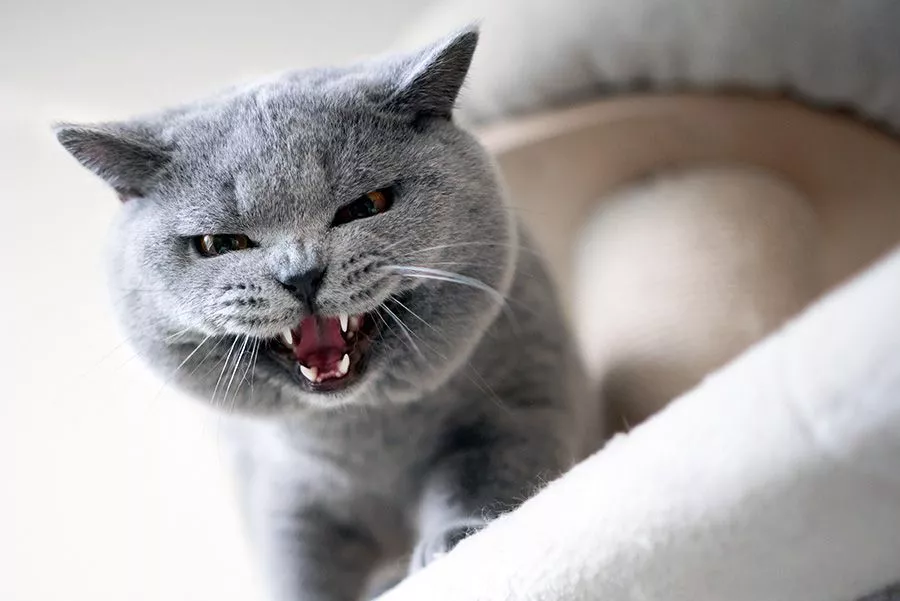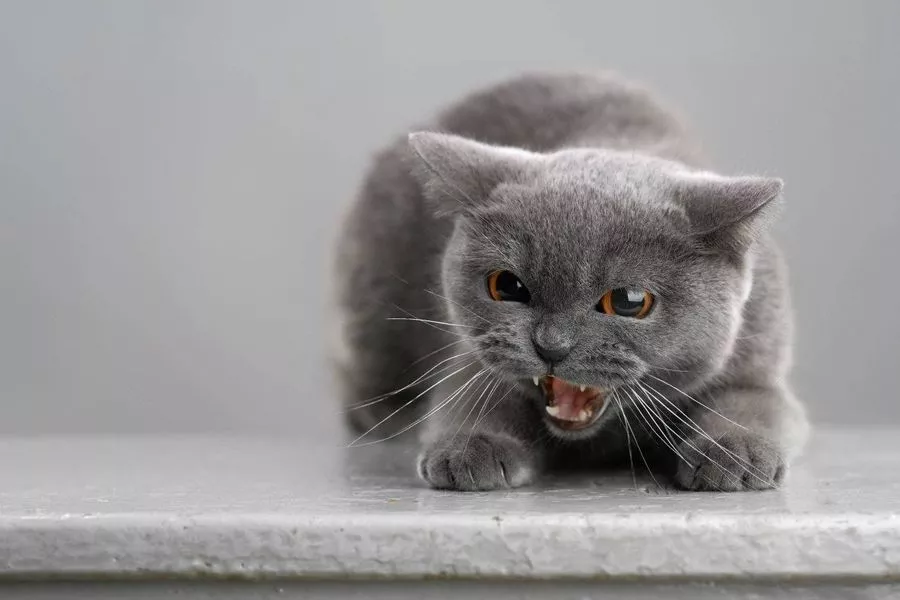You’d prefer to have an easy-going feline friend who won’t be a nuisance. Even if cats are your favorite, getting scratched or bit is not a fun experience.
The British Shorthair is a cat that’s easy-going and friendly. The British shorthair cat may be the right cat for you. However, even the gentle British shorthair can become aggressive in certain circumstances.
Are British Shorthair Cats Aggressive? Generally, the typical British Shorthair feline is composed, affectionate, and enduring. However, an exception arises when they encounter potential prey – in such cases, this breed will pursue small animals or birds if they come across them.
If you have an interest in pedigree cat breeds, this article will help you for sure. The main focus is providing insights into teddy bear cats as current or potential owners; whether currently owning one or considering one for adoption; this piece aims to broaden your knowledge.
As a cat owner, you probably have many questions about its behavioral traits, interactions with other pets and children, or handling instances when aggression arises from the animal. As you read further, you will find detailed answers to these queries as well as many others.
Also Read: Can British Shorthairs Go Outside?
Can British Shorthairs be Aggressive?
Are British Shorthair Cats Aggressive? It depends on whether you are a mouse. Despite being descended from generations dedicated to mousers, this breed does not have an aggressive nature when it comes to dogs, other cats, humans, and larger animals.
It’s actually their calm and docile demeanor that makes them so popular. Dogs that are well-behaved, non-aggressive, and have a good temperament will get along with them. British Shorthairs are great with children, even those with smaller hands and more grabby ones. A cat’s usual reaction to an uncomfortable interaction is to hiss and bite. However, a British shorthair will retreat and keep a safe distance from the other person without fuss.
Naturally, there are exceptions, When provoked, a cat that is normally calm can also become aggressive.
Do British Shorthair cats bite?
Although British Shorthair cats tend to be friendly and relaxed, they can still show aggressive behavior such as biting, growling, or scratching. Therefore it is important to monitor both his behavior and body language to identify where any issues exist and make necessary corrections as soon as possible.
Also Read: Are British Shorthair Cats Good With Dogs?
3 Reasons Why Your British Shorthair Might Show Aggression
Prey animals
Small pets such as mice, gerbils, or hamsters can cause even the calmest British Shorthairs to lose their cool. British Shorthairs are known to attack and chase small mammals, birds, and any other creatures that trigger the predatory instinct. She will attack them whenever she gets the chance once she realizes they are in the house. It is impossible to remove this behavior from a British Shorthair. It is impossible to train the micer out of British Shorthairs.
Abuse or Harassment
Aggression in your British Shorthair may also stem from provocation within the household, whether intentional or accidental. For example, if a dog, another cat, or a young child repeatedly bothers your British Shorthair cat and provokes it with physical aggression towards this instigator(s), she could respond with aggression towards them as a means of defense.
Untreated aggression among cats can wreak havoc and become widespread, prompting both humans and other animals to lose trust in them. To address this issue effectively, it’s vital that problematic behaviors are identified and addressed to create a safer environment for them.
Illness, or Injury
Injury and ill health can cause aggressive behavior and destructiveness among cats including British Shorthairs. It may take a while to notice that something is wrong with your cat, especially if it is a strained muscle or joint. When the cat feels pain but can’t express it, she might lash out. Senior cats may develop dementia towards the end of life, which can lead to aggressive behavior in cats who were previously calm.
Your vet can detect dementia in cats and provide appropriate care. While dementia cannot be cured, it can be managed so your cat has more comfort during its later years. Read further to understand its causes and ways you can assist a British Shorthair, a gentle cat breed.
Also Read: Do British Shorthair Cats Like Cuddles?
Why Does My Cat Bite Me When I Hug Her And How to Avoid It?

Stay away from doing things that annoy or distress your cat. Though British Shorthair cats possess many desirable characteristics, they’re not known for being cuddlers; therefore they prefer quick cuddles over forced intimacy. Instead, this breed prefers being petted when standing or sitting nearby rather than on your lap.
As part of proper care for this breed, British Shorthairs should be given their space. Try slipping your hand behind her forelegs to see if she will accept you picking her up; if so, gently pick up and hug her back legs before giving a treat!
Do not push her and allow her to leave as soon as she becomes uncomfortable, lest you risk biting or scratching from being grabbed and held on too tightly. Giving your cat space and respect may result in her coming closer for cuddles or belly rubs!
My own experience has shown me that this approach can be useful in solving many of the issues surrounding British Shorthairs that are “aggressive”. Some owners mistakenly think their cat owes them some form of affection and will try forcing it upon them through petting or hugging when this approach won’t work in terms of building lasting pet relationships.
Also Read: Are British Shorthair Cats Hypoallergenic?
Why is my British Shorthair so Aggressive to People Outside of Our Family?
Inform young family members in your house to treat your cat gently and with respect, particularly children and toddlers who might accidentally get hurt or harm it by picking her up or trying to grab it. They should be closely watched to prevent such accidents from happening.
British shorthair cats make great pets for small hands, with dense and silky fur that attracts small hands. British shorthairs can make excellent cats for children; however, when threatened or hurt they may react by lashing out.
If she is repeatedly injured by someone, she will learn that this individual poses a threat and begin scratching or swatting at them as a way of protecting herself – just as any dog would.
The dog may be playing with your British shorthair, but the cat does not always know this. All she knows is that she is being influenced by a more energetic and larger animal. You should supervise the interaction and separate the two animals before your cat becomes aggressive.
It is possible that they develop a mutual animosity. Once they get used to one another, dogs and British shorthairs usually get along well.
I would be suspicious if the person was an older child or adult. Watch them closely to ensure they are not doing anything that will annoy or upset the cat. It may not be intentional. Some people don’t understand feline body language or know when to move away.
Explain to the person that the cat does not like what they are doing, and that it is time for them to change their approach.
Also Read: Are British Shorthairs Cats Friendly?
How Do I Stop My Cat From Being Aggressive to Everyone?

A British Shorthair from a registered breeder will not be aggressive. You should speak to the breeder if you are experiencing a lot of behavioral issues and you can’t find any obvious cause – there is no apparent illness, injury, or provocation.
She could have been neglected or abused; taken too early from her mother, might have been socialized incorrectly. These same issues can occur in adult cats that come from a difficult background.
You may be able to resolve the issue with patience and care, or you may require specialist assistance. If your British shorthair was always calm and well-behaved, but now is acting aggressively or destructively try to find out what is causing the change.
Praise and reward your cat for displaying calm, friendly behavior. This will encourage the behavior to continue.
Has your household routine dramatically changed? You may have lost or gained a pet. Has a baby just arrived? All of these situations can cause a cat to become anxious or even aggressive. Your vet should examine your British Shorthair if nothing appears to be wrong. It could be that she is suffering from a medical condition that is causing her to act in this way.

Hi, this Sienna Metts, the purr-fect authority in the captivating world of feline wisdom. I live in White Plains, NY. With years of experience in studying and understanding the behavior, health, and unique traits of different cat breeds, I have earned a well-deserved reputation as a feline connoisseur. Through my articles, I’ll be sharing captivating stories, practical advice, and expert tips on topics ranging from breed characteristics, care and eating guidelines to training techniques and holistic health solutions.











